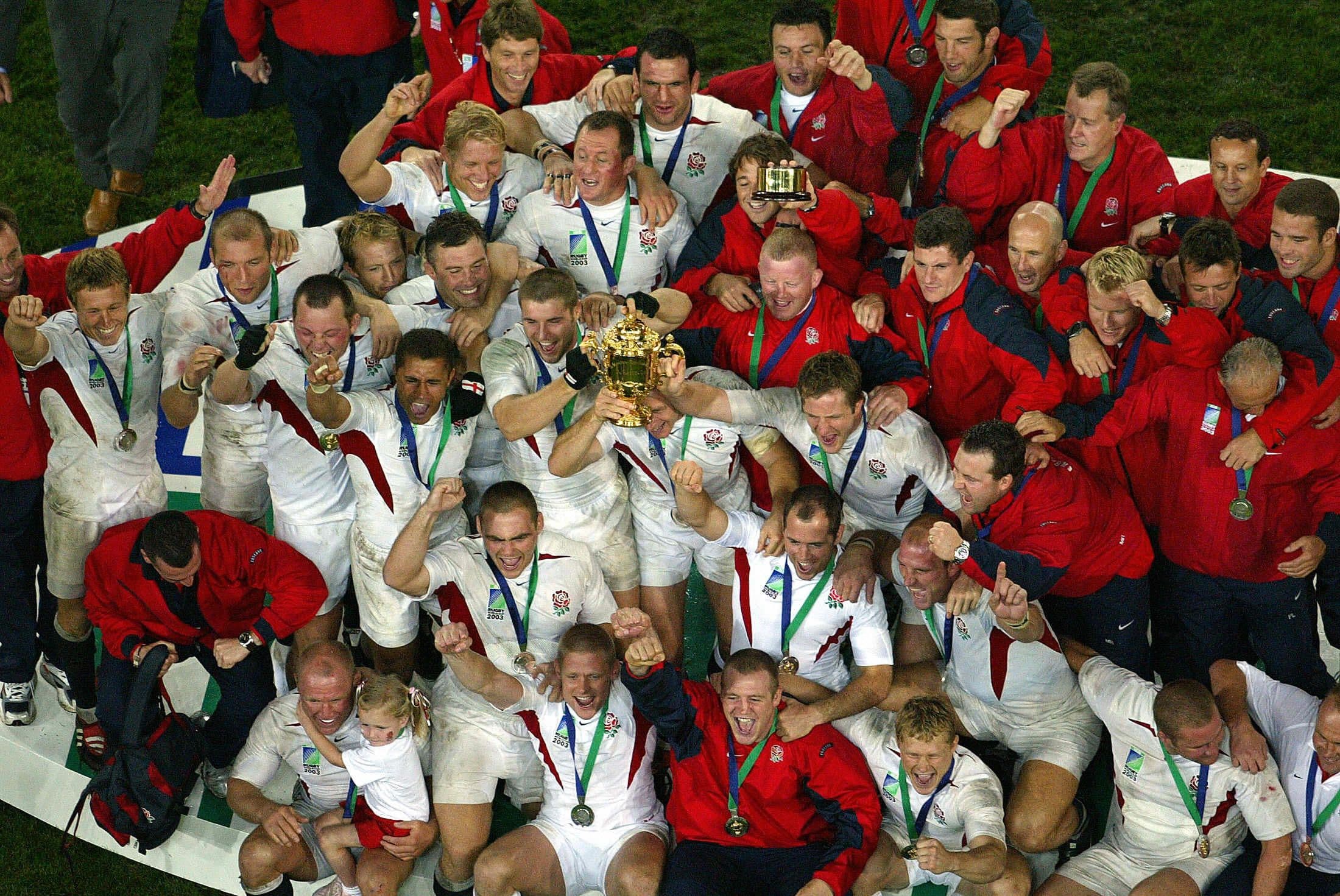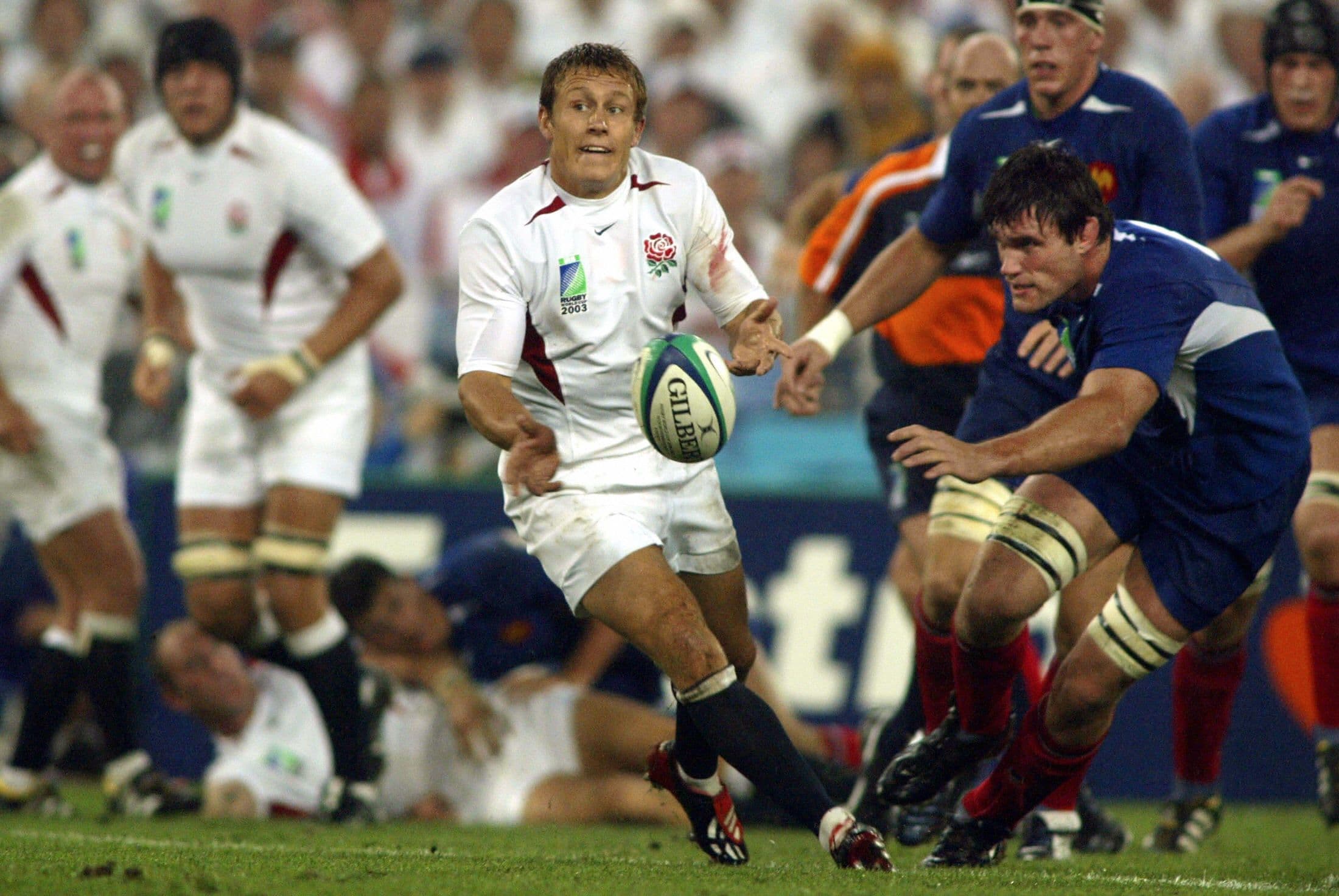Rugby
When Did England Win the Rugby World Cup?
The Rugby World Cup (RWC) is one of the biggest sports events in the world. England won the Rugby World Cup in Australia in 2003. There have been ten editions since the inaugural RWC in New Zealand in 1987. South Africa has won the most William Webb Ellis Trophies, winning their fourth title in 2023.

English players celebrate with the William Webb Ellis Cup//Getty Images
England won the Rugby World Cup in Australia in 2003. The Rugby World Cup (RWC) is one of the biggest sports events in the world. There have been ten editions since the inaugural tournament in 1987. The fifth edition of the RWC is England’s only success. South Africa has won four William Webb Ellis Trophies, the most in the world.
The Springboks won the previous edition in France in 2023 and are the current back-to-back world champions. New Zealand is the second-most successful nation at RWC tournaments. They have won three titles. Australia won both their titles in England in 1991 and 1999. England is the only Northern Hemisphere country to lift the Webb Ellis Cup.
Rugby World Cup Champions
| Rank | Country | Final | Year |
| 1 | New Zealand (1) | New Zealand 29 – 9 France | 1987* |
| 2 | Australia (1) | England 12 – 6 Australia | 1991* |
| 3 | South Africa (1) | South Africa 15 – 12 New Zealand | 1995 |
| 4 | Australia (2) | Australia 35 – 12 France | 1999 |
| 5 | England (1) | England 20 – 17 Australia | 2003 |
| 6 | South Africa (2) | South Africa 15 – 6 England | 2007 |
| 7 | New Zealand (2) | New Zealand 8 – 7 France | 2011 |
| 8 | New Zealand (3) | New Zealand 34 – 17 Australia | 2015 |
| 9 | South Africa (3) | South Africa 32 – 12 England | 2019 |
| 10 | South Africa (4) | South Africa 12 – 11 New Zealand | 2023 |
England is one of the dominant forces in world rugby. England is level with Wales for the most Six Nations Championships (39). But England has won the Rugby World Cup, Wales has never made the final. The Red Roses have played in four World Cup finals, losing three, and winning one. SportsBoom recounts the dramatic moments that led to England winning the 2003 Rugby World Cup final against Australia.
2003 England Rugby World Cup Recap
Rugby is a curious sport, it originated in England at Rugby School. It is baffling that England has only won one RWC tournament, despite being one of the richest nations in the world. England were the best team in the world when they won the 2003 Rugby World Cup. England had been poor for years following the 1995 RWC. The nation hit its nadir when they lost 76-0 against Australia in 1998, their heaviest defeat in history. Weeks later, New Zealand thrashed England 64-22.
Despite these chastening defeats England head coach Clive Woodward spent seven years building to the 2003 RWC down under. By 2002, his team had risen from no-hopers to the number one ranked side in the world. England defeated all-comers in the years leading to the tournament. Stacked with a core of veterans and exciting young players, England won multiple Six Nations Championships before winning away in New Zealand and Australia.
Beating the best teams in the world gave them hope of a first RWC title. Led by the colossal lock Martin Johnson, and the trusty boot of Wilkinson, England swept aside South Africa, Samoa, Georgia, and Uruguay to top Pool B with nineteen points. Wilkinson was the top scorer, with 113 points at the tournament. He would end his career as the all-time rugby points scorer until Dan Carter and Owen Farrell passed his record tally.

English fly-half Jonny Wilkinson pas//Getty Images
Johnson’s well-drilled team scored 255 points in their four matches, the third-most during the pool stages. Only New Zealand (282) and Australia (273) scored more. The ease with which England won their pool matches proved their Rugby World cup Squad was serious. They cruised to a one-sided 29-17 victory over Wales in the quarter-final at Suncorp Stadium in Brisbane.
Wilkinson kicked six penalties, one drop goal, and converted Will Greenwood’s second-half try, to put England into the semi-final against France. Another one-sided match saw England advance to their first RWC final since 1991. They beat France 24-7. Wilkinson scored all his team’s points. He knocked over five penalties and landed three drop kicks inside Stadium Australia to give his side a shot at glory inside the same ground in a week versus the hosts.
Australia had beaten Scotland 33-16 in the quarter-final, and upset New Zealand 22-10, thanks to Elton Flatley’s boot, in a tense semi-final at Stadium Australia. Australia would play England in a rematch of the 1991 RWC final at Twickenham in London. The result would not be the same.
2003 Rugby World Cup Final
England won the 2003 Rugby World Cup final. They defeated Australia 20-17 after extra time at Stadium Australia in Sydney. Johnny Wilkinson’s last-gasp, match-winning drop goal clinched the William Webb Ellis Trophy for Clive Woodward’s team. Wilkinson’s drop goal was reminiscent of Joel Stransky’s famous match-winning drop kick against New Zealand to seal the title for South Africa in 1995.
Lote Tuqiri opened the scoring in the corner in the sixth minute, but Flatley’s wide conversion attempt hit the post. Wilkinson added three penalties to make it 9-5 on the half-hour mark. Lawrence Dallaglio’s break saw Wilkinson put Jason Robinson away in the corner before halftime to increase the Red Rose’s lead to nine at the break. The conversion was wide.
Eddie Jones’ men fought their way back into the contest. Flatley landed three penalties, including the game-levelling kick, with ten seconds remaining to send the final into extra time. Wilkinson slotted another long-range penalty to make it 17-14 to England. The final was tied at 17-all after Australia levelled the scores thanks to a ninety-seventh-minute Flatley penalty.
Johnny Wilkinson’s Famous Drop Goal Wins Thrilling Final
But a poor clearance from Matt Rogers gave England an attacking lineout outside the Wallabies’ 22. With seconds remaining in the second half of extra time, England powered forward, searching for a penalty. There was nothing on for England, but Matt Dawson broke around the fringe of the ruck to set up the final passages of play. Wilkinson sat behind the breakdown waiting for his chance. England, without a scrumhalf because Dawson was stuck at the bottom of the ruck, kept calm.
Martin Johnson set up another phase with a direct run next to the ruck. This gave Dawson time to get to the ensuing ruck. And with time ebbing away, the scrumhalf found Wilkinson, who launched a right-footed wobbling drop goal through the posts. Australia restarted, but England won possession and sent the ball flying into touch. Andre Watson promptly blew his whistle for full-time. England had done it; they became the first team from the Northern Hemisphere to win the World Cup.

Kaylan Geekie is a sports fanatic. He attended Durban High School before moving to Scotland, where he lived for 15 years. During his time in the United Kingdom, Kaylan graduated with a first-class BA Honours Degree in Sports Journalism at the University of the West of Scotland. Kaylan worked for nine years as the Match-Day Editor of SuperXV.com, reporting on Super Rugby, The Rugby Championship, the 2015 Men's Rugby World Cup and the 2017 British & Irish Lions series for the website.